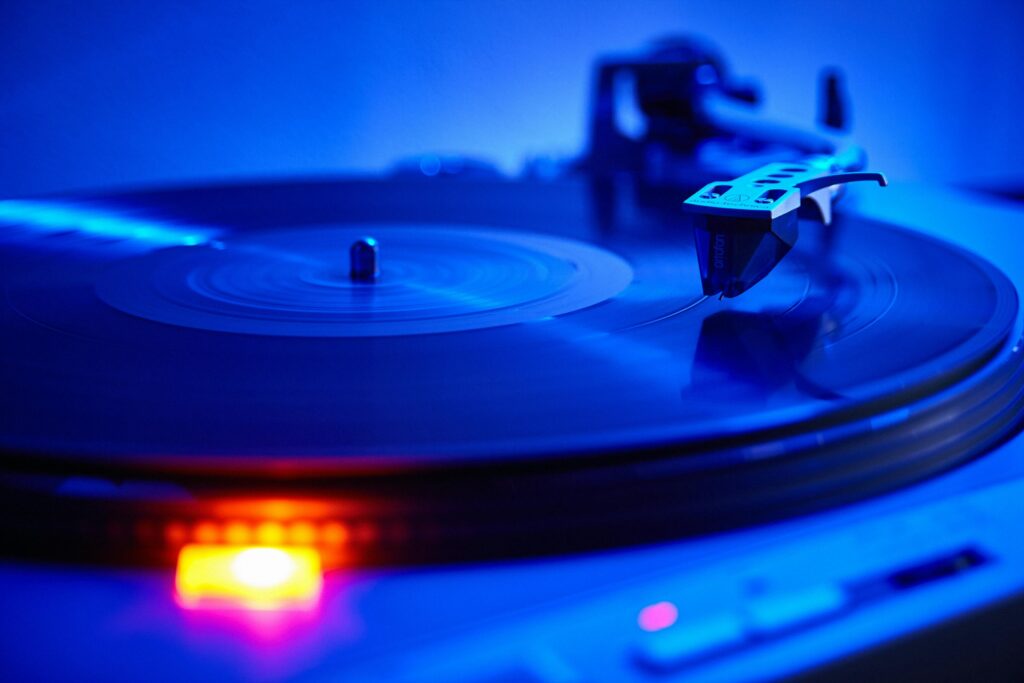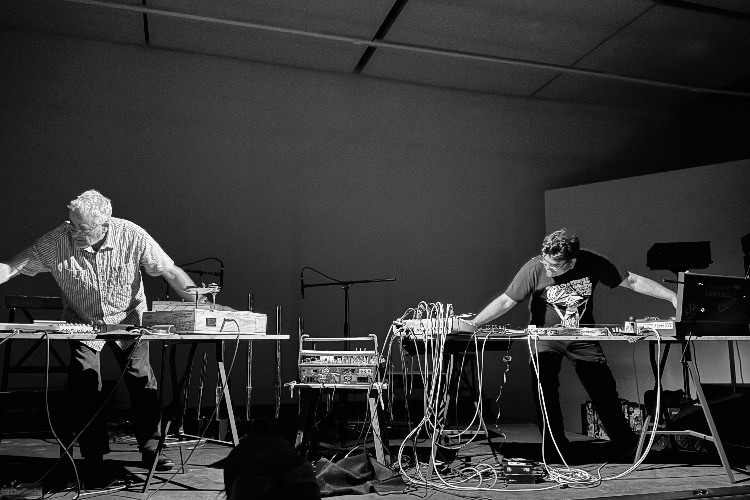We continue our conversation with Fred Frith (read part one here) with a focus on his work with homemade instruments, specifically his duo with Sudh Tewari, Normal.
PostGenre: A little earlier, you mentioned how you put aside the guitar for a few years in the early 1980s. What led to your stepping away from the instrument?
Fred Frith: I did a solo tour of Japan. I was very excited to go there. Then I was still relatively new to playing solo performances. Even though by then, 1981, was so long after Guitar Solos (Caroline, 1974) came out in 1974, playing solo was still a relatively new idea for me. In Japan, I did eleven concerts in eleven days.
While there, I got fixated on the idea that being an improviser meant I could never do the same thing twice. This is a really stupid way of thinking, but I became obsessed with the idea that if I did something very good, I had to make a point of not doing it again. I was always looking to do something new, and as a result, I became a mess. I was neurotic. My fingers were bleeding when I came off the stage. I was physically exhausted. I was both exhilarated and depressed from that tour. Exhilarated by the whole new world that opened up to me from experiencing Japan for the first time. But I also felt that, as a player, I got lost, even though a record came out of that tour eventually, Live in Japan (Recommended, 1982).
I decided that the guitar was something I should put aside for a bit. Part of that was also because I’d started to become quite violent with the instrument and was afraid of damaging it. I started building things I wouldn’t be afraid of damaging, which were mostly planks of wood with strings that I could bang nails into if I wanted. The odd thing was that the homemade instruments turned out to be rather delicate. And an instrument that I thought would sound something like a guitar ended up sounding more like a koto or incorporating some other sets of references. I made my own instruments for a while, and I’m doing it again now.
PG: How did you get back into playing them?
FF: A student of mine, Sudhu Tewari, who is an instrument builder, convinced me to pull these instruments out again. Then we made some new ones together as well. We started a “band” called Normal, which is entirely based on homemade instruments. And we’re still at it twenty years later! We will be performing at Roulette with Lotte Anker as a guest. It’s been an intense process in the last two or three years to rebuild, find, reinvent, and invent new instruments and play them. But it all goes back to the beginning of the ‘80s when I had abandoned the guitar.
PG: Since Normal is usually only you and Sudhu, how do you feel expanding beyond the two of you to add Lotte may change the dynamic of the group?
FF: Well, the joyful thing is that I haven’t a clue, which is the whole point. I’ve been working a lot with Lotte over the years. We’ve toured together and recorded together. We recently recorded some material in Denmark when I was there back in June. We spent two days in the studio recording trio material with gabby fluke-mogul. It was very intense and interesting. After that was done, Lotte and I went to a different studio and spent a few days recording again, this time as a duo.
When you’ve recorded for four days straight and have been working all day on improvised music, you get a lot of ideas out of your system. You arrive at a point where suddenly you have a blank slate. It seems like you’ve done everything. Rather than stop at that point, you should use it as a starting point. I felt very strongly in those two days with Lotte that we arrived at a point where it was super intense and also unlike anything we’d ever done. I had an idea that it would be a very good starting point to use the material that she was developing and see how that would work with Normal. So, the idea of Lotte joining us came from there.
PG: What is your process for creating the new instruments for Normal?
FF: We did a few concerts with the instruments we had. For a while, Sudhu was the Artist in Residence at the San Francisco Dump. He had access to discarded bits of all kinds of stuff. He would recuperate bits of junk people had thrown away and build things out of the electronic components.
During [the coronavirus pandemic], we were invited to do an exhibition of invented instruments at the Center for Contemporary Music in San Francisco. We started working on ideas of new instruments to make for it. We sat down and talked about things like what a homemade instrument is and what the point of it is. There are so many people making instruments, and you find that often, the instrument that gets invented does only one thing. There’s one gesture associated with it. When playing, you make that gesture, something happens, and that’s the instrument. That didn’t seem very interesting to us. It’s very easy to do that on many levels, but it wasn’t very useful from a point of view of making music together. We had conversations about how if we build an instrument, why shouldn’t it be just as necessary to practice on the instrument to develop the technique necessary for it to be useful? We wanted to build instruments that would require us to familiarize ourselves and have a technique to be able to get everything out of it.
PG: What can you share about some of these new instruments?
FF: Sudhu is extremely inventive and has all kinds of ideas. And he has a workshop in his house. He was building things like guitars without strings, using clamps that he could magnetically clamp above the pickups, and putting different kinds of materials there that you can play to have a gamelan-esque sound or a completely percussive aspect. I wanted an instrument that could combine both percussion and pitch. So, we have an instrument that has five different contact mics in it, each of which can be switched individually. You can decide to set one aspect of the instrument only or you can set all of them. Some of the aspects involve a bit of percussion, which gets amplified. And if you take the application away, it changes the sound of everything else. There’s a wide variety of timbres possible on the instrument.
We also made a portable piano. And by that, I mean truly portable. Many of the ideas for instruments, especially Sudhu’s, came with the idea that the only way we will be able to play them is if the instruments are portable. We have to be able to transport them. So Sudhu built instruments into cases. A toolbox became the body of the portable piano so he could just shut the case and then get it onto a plane. We were doing pragmatic things to see what could happen.
We also have very big instruments; very long string instruments, which could have three sliding bridges and pickups embedded at different points of the neck. Fascinating instruments that don’t really sound like anything else!
PG: You mentioned how homemade instruments are often more fragile than the guitar. You hear so many horror stories of musicians whose instruments are damaged while traveling. Do you find it harder to travel with homemade instruments than a guitar?
FF: It’s always going to be an ongoing issue, even with my guitars. But it’s not just a question of fragility; it’s a question of logistics. I did a tour last year where we were playing in a different city pretty much every day. If they lost my guitar between point A and point B, by the time it got to B, I’d already be somewhere else. So, how does the guitar catch up with you? I have spent many nights in airports waiting for a flight to come in so I could get my guitar before somebody would take it away and send it somewhere else. I stopped checking my guitar to avoid that problem, but that also creates the problem of carrying the guitar on the plane and being told at check-in that I can’t. But usually, you can overcome problems.
The issue you’re talking about is more one for something very old or fragile. It’s difficult to take those as carry ons on the plane. You end up needing to buy a seat for the instrument if you want to bring it. That’s the only thing that completely works but that can be more expensive. The good news is that all of our newer instruments are pretty sturdy. I have a giant Pelican Case into which I can fit four instruments, a mixer, and some pedals. That’s my portable unit, and Sudhu has a few portable units like that too. So, we can travel reasonably confidently.
PG: Since you have been playing both, has working with the homemade instruments shaped or changed how you approach the guitar?
FF: Absolutely! The first concert I did on a guitar after three or four years of not playing it for solo performances revealed that the things I’d learned from the homemade instruments were not at all about being violent, brutal, percussive, or any of those things I expected. It was more about how delicate you can make things when you add certain small elements. I became more interested in certain minimal preparations of the guitar, which allowed me to pluck it in a very gentle way and have it produce a completely different resonance. There were a lot of things that became more delicate as a result of playing the homemade instruments, which was interesting.
As I always tell students, if you end the process with what you thought you’d have when you started, you‘ve failed. And I believe that. I believe that the process will always open itself up in a way that you can learn from it and develop your ideas in unpredictable ways. If you ignore those things, then nothing will ever change.
Fred Frith will be performing solo at Roulette on December 6, 2024. More information is available here. It will also be available via livestream. The following day, December 7, 2024, he will be performing trio at Roulette with Sudhu Tewari and Lotte Anker as ‘Normal Give or Take.’ It too will be available for livestream. More information on Fred Frith is available on his website.
Photo credit: Carly McLane






